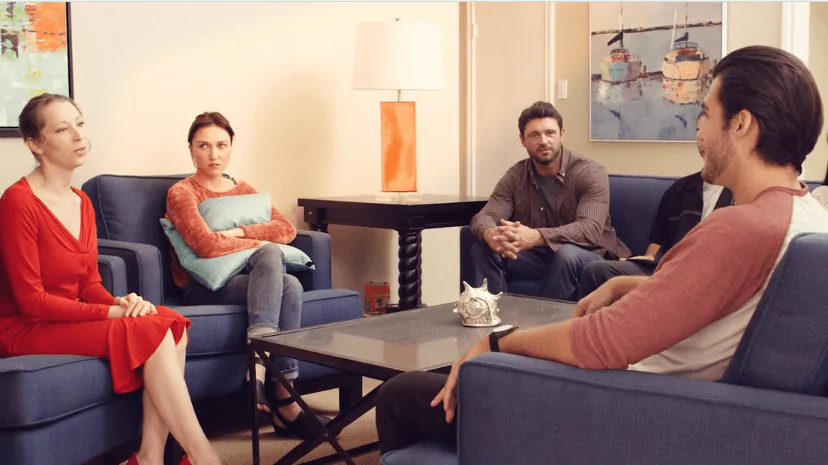24/7 Helpline:
(866) 899-221924/7 Helpline:
(866) 899-2219
Learn more about Dialectical Behavior Therapy centers in Lyon County

Other Insurance Options

Self-pay options

Kaiser Permanente

Ambetter

Highmark

Magellan

State Farm

BlueShield

Coventry Health Care

Ceridian

Anthem

Humana

Access to Recovery (ATR) Voucher

Premera

Group Health Incorporated

Cigna

CareSource

American Behavioral

Optum

WellCare Health Plans

Oxford

Mental Health Center of East Central Kansas
Mental Health Center of East Central Kansas is a private rehab located in Emporia, Kansas. Mental He...

Corner House
Corner House is a private rehab located in Emporia, Kansas. Corner House specializes in the treatmen...

Psychotherapy Associates
Psychotherapy Associates is a private rehab located in Reading, Massachusetts. Psychotherapy Associa...

Family Guidance Center – Reading
Family Guidance Center – Reading is a private rehab located in Reading, Pennsylvania. Family Guidanc...

Pennsylvania Counseling Services – 5th Street
Pennsylvania Counseling Services - 5th Street is dedicated to provide mental health and substance ab...

Pennsylvania Counseling Services – Berks County
Pennsylvania Counseling Services - Berks County is dedicated to provide mental health and substance ...

Reading Hospital – Drug and Alcohol Rehabilitation
Reading Hospital - Drug and Alcohol Rehabilitation offers inpatient services for individuals with a ...

Berks Counseling Center
Berks Counseling Center is a private rehab located in Reading, PA. Berks Counseling Center specializ...

Berks Parents Services Collaborative
Berks Parents Services Collaborative is a private rehab located in Reading, Pennsylvania. Berks Pare...

Threshold Rehabilitation Services
Threshold Rehabilitation Services is a private rehab located in Reading, Pennsylvania. Threshold Reh...

Council on Chemical Abuse
The Council on Chemical Abuse provides countywide leadership in the development and implementation o...

DGR Behavioral Health
DGR Behavioral Health is a private rehab located in Reading, Pennsylvania. DGR Behavioral Health spe...

Pennsylvania Counseling Services – Reading
Pennsylvania Counseling Services – Reading is a private rehab located in Reading, Pennsylvania. Penn...

Pennsylvania Counseling Services – Children’s Services Mount Penn
Pennsylvania Counseling Services – Children’s Services Mount Penn is a private rehab located in Read...

Caron Counseling Services
Caron Counseling Services is located in Reading, Pennsylvania. Caron Counseling Services is an outpa...

Hunter Holmes McGuire VA Medical Center – Emporia Community Based Outpatient Clinic
Emporia VA Community Based Outpatient Clinic is located in Emporia, Virginia. Emporia VA Community B...






































Meta Addiction Treatment in MA
Meta Addiction Treatment in MA is a private rehab located in Reading, Massachusetts. Meta Addiction ...

Hogar Crea
Hogar Crea is a drug rehab facility located in Reading, PA. Hogar Crea offers substance abuse treatm...

New Directions Treatment
New Directions Treatment Services (NDTS) is a nonprofit substance abuse treatment center in Reading,...

ADAPT
ADAPPT is an inpatient and outpatient rehab located in Reading, PA. ADAPPT specializes in the treatm...

Project Transition
Project Transition is a private, community based mental health and substance abuse treatment program...

Center for Mental Health
Center for Mental Health is a private rehab located in Reading, Pennsylvania. Center for Mental Heal...

Reading Hospital Center for Mental Health
Reading Hospital Center for Mental Health is a private rehab located in Reading, Pennsylvania. Readi...

Child and Family Support – Reading
Child and Family Support – Reading is a private rehab located in Reading, Pennsylvania. Child and Fa...

Progressions Behavioral Health Services – Reading
Progressions Behavioral Health Services is an outpatient treatment program that provides services to...

Chimes – Holcomb Behavioral Health Systems
Chimes - Holcomb Behavioral Health Systems provides services for children and adults who may be deal...

CONCERN – Reading
CONCERN – Reading is a private rehab located in Reading, Pennsylvania. CONCERN – Reading specializes...

Familicare Counseling Center
Familicare Counseling Center is a private rehab located in Reading, Pennsylvania. Familicare Counsel...

AA – Alcoholics Anonymous
AA – Alcoholics Anonymous is a non-profit rehab located in Reading, Pennsylvania. AA – Alcoholics An...

Community Services Board – Greensville Counseling Services
Community Services Board - Greensville Counseling Services offers outpatient treatment for adults an...




































































































































































